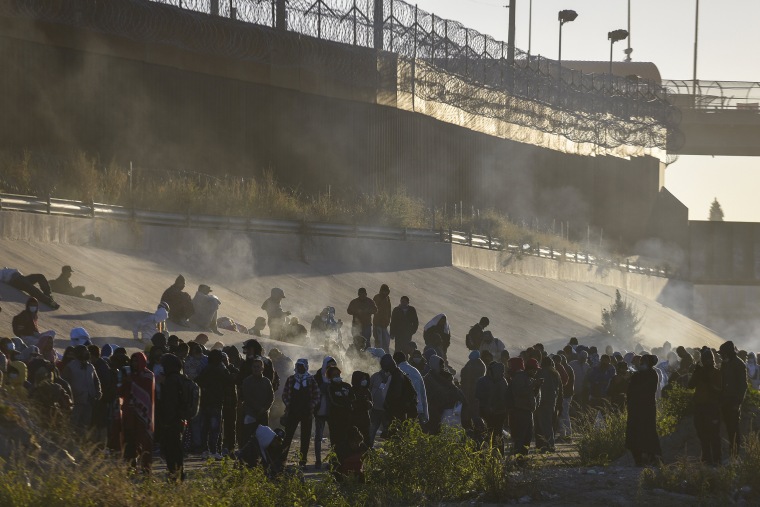The Biden administration is solidifying plans to slash the number of migrants who would qualify for asylum at the southern border while opening up new, narrow pathways for some would-be migrants to apply while still in their home countries, four sources familiar with the plan said.
Among the proposals under strong consideration are new programs for Haitians, Nicaraguans and Cubans to apply for humanitarian parole from their home countries, three U.S. officials said. The pathways for those migrants would be similar to a program launched this fall that admitted 24,000 Venezuelans who could prove they would be sponsored in the U.S. while denying entry to the vast majority of Venezuelans arriving at the border.
The Department of Homeland Security is also planning new training for asylum officers who interview migrants crossing the border, the three officials said. They would be instructed to let migrants enter the U.S. to pursue protections if they qualify under the international Convention Against Torture, a much higher bar than previously required for asylum.
Those who cannot prove they’re likely to face torture if returned to their home countries would have to show they first sought and were denied asylum in a country they passed through on their way to the U.S. border, four sources familiar with the planning say.
That model, first reported to be under consideration by The New York Times, is commonly called a “transit ban” and was first put into practice in 2019 by former President Donald Trump’s hard-line immigration adviser Stephen Miller.
Asked about the Times report during an interview with NBC News on Monday, DHS Secretary Alejandro Mayorkas did not deny that a so-called transit ban was under consideration.
“I would have to see what is specifically proposed to understand what it provides for, what it doesn’t provide for. Let me say this, I believe profoundly, as does this administration, in our asylum system. It is one of our crown jewels, and we will continue to uphold it,” Mayorkas said.

A spokesperson for DHS said nothing has yet been decided, and the White House did not respond to requests for comment.
The administration held at least six meetings on the topic over the weekend, both at DHS and White House levels, according to two U.S. officials.
The net effect of the plan under consideration would be a drastic reduction in the number of migrants permitted to remain in the U.S. while seeking asylum, and an increase in the number returned to Mexico or deported to their home countries.
Details of the plan may still be tweaked, but the Biden administration faces a court-imposed Dec. 21 deadline to lift Covid-19 restrictions at the border. Since those restrictions known as Title 42 began in March 2020, asylum-seekers have been turned back into Mexico more than 2.4 million times. When the ban lifts, officials have told NBC News that the number of migrants crossing the border may increase by as much as 2,500 per day.
Three U.S. officials familiar with the planning said the U.S. is in talks with Mexico about how many migrants the U.S. will be allowed to send back across the border into Mexico even after Title 42 is lifted.
Some asylum advocacy groups and former and current Biden administration officials have taken issue with the plans, saying they go too far in cutting off pathways to asylum while not doing enough to safely welcome qualified asylum-seekers in through an orderly processing system.
“They are playing dangerously with the machinery of the Trump administration. That policy was functionally an elimination of access to asylum at the southern border for most asylum-seekers,” said Greg Chen, senior director of government relations at the American Immigration Lawyers Association.
Chen said opening up new legal pathways will likely not make up for the numbers of asylum-seekers who will be denied entry. “I cannot imagine what they could do legally with their existing authority that would substantially ensure access to humanitarian protection and relief,” he said.
Lawyers from the American Civil Liberties Union, which sued the Trump administration over the previous transit ban, said they would do so again if the Biden administration tries a similar policy.
“We successfully sued over the transit ban under the Trump administration and will immediately sue if the Biden administration renews the ban. A transit ban is illegal regardless of which administration employs it,” said Lee Gelernt, the ACLU attorney who argued the successful appeal again the Trump transit ban.
A Biden administration official who has argued against the plan told NBC News the White House should be securing money to deal with the large displacement of migrants across the Western Hemisphere rather than simply blocking them from crossing into the U.S.
“This is not a surge; it’s a new reality,” the official said.
A former Biden administration official said the new plans are an overreaction and not needed after Democrats held control of the Senate despite immigration being a key issue in hotly contested midterm races.
“I don’t see the political calculus here. You’re not going to get credit from Republicans for doing this,” the former official said.


